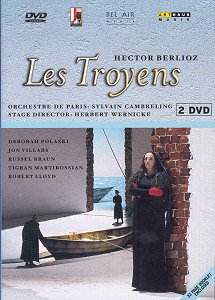Most people have not had the opportunity to see a performance
of this giant work which is considered a masterpiece by many (but not
by all!). Berlioz himself never saw the complete opera and staged performances
are still very rare. Even today, the four hours opera is often split
into two for performance purposes (for example the current ENO performances).
Therefore the issue of DVDs of this full performance from the 2000 Salzburg
Festival is very welcome even though there are controversial aspects.
Many of the difficulties of Les Troyens lie with Virgil
who wrote this story of war, deception, passion and obsession on the
largest scale. This works very well in literature but less well as an
opera (operas work best with a fairly simple story). In this version
written by Berlioz himself, much of the action takes place off-stage,
and the characters talk about what has happened or will happen and it
is difficult to present a staging which reflects the grand scale of
the events described.
Herbert Wernicke in his staging uses a semi-circular
whitewashed wall rent by a gash through which in turn, parts of the
Trojan Horse, trees, sea etc can be observed. Contemporary costumes
are worn; in Troy everyone wears black except for blood red gloves;
in Carthage there are similar costumes but with royal blue gloves. Usually
I prefer traditional stagings to such a ‘concept’ production; however
I found myself won over by the generous sweep of this staging which
reflected the importance of the events depicted. Some details however
did grate such as the appearance of what looked like cheap plastic toy
machine guns, and the symbolism of the red/blue gloves escaped me. On
balance however I did like the distinctive cold beauty of this production.
However, although I can understand the reason why it was done, I cannot
accept the omission of the dance numbers (except of course the Royal
Hunt and Storm, which contains the most famous music of the opera, and
is included).
The American, Deborah Polaski is given the role of
both Cassandra and Dido. Her performance and singing as Dido is the
highlight of the performance, especially in the dramatic final scene
where her wonderful voice depicted the tragedy of the events; unfortunately
vocally she did not seem completely at home in the part of Cassandra.
The young American tenor Jon Villars plays the part
of Aeneas and looks like an American Football player and his singing
seldom rises above the workmanlike. The chorus and the other parts are
all good, with Yvonne Naef’s Anna and Toby Spencer’s Hylas having outstanding
vocal beauty.
Sylvain Cambreling is an experienced and fine conductor
who gets expressive tone and good playing from the orchestra, although
I cannot suppress the feeling that certain famous Berlioz conductors
such as Beecham or Munch might have injected a little more feeling in
places. The filming and presentation and sound recording of this two
disc set is good, but the booklet is pretentious and undistinguished.
Overall I enjoyed this performance and expect to return
to it often.
Arthur Baker
